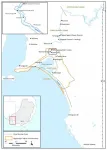(Press-News.org) BOSTON - In addition to lowering risk of heart disease, maintaining a heart-healthy lifestyle may pay off in lower risk for developing cancer, researchers from Massachusetts General Hospital (MGH) and other centers in the United States and the Netherlands have found.
Looking at the potential link between cardiovascular disease (CVD) and cancer among participants in two large population-based health studies, Emily S. Lau, MD, and Jennifer E. Ho, MD, from the division of Cardiology at MGH and their co-authors found that traditional risk factors for CVD, including older age, male sex, and current or former smoking were all independently associated with increased risk of the development of cancer.
In addition, they found increased levels of natriuretic peptides--markers of stress on the heart--also predicted higher cancer risk among study participants.
Although participants who already had a history of heart disease before the study or experienced a cardiovascular event such as heart attack or heart failure after joining the study were not found to be at increased risk of developing cancers, those who had ideal cardiovascular health at study entry had lower risk of future cancers, the investigators reported in JACC: CardioOncology.
"We found an association between a heart-healthy lifestyle and a lower risk of cancer, and the opposite is true: that a less heart-healthy lifestyle is also associated with higher risk of cancer, but we can't prove that there is causation in this epidemiologic study," says Lau.
Lau and colleagues evaluated data from 20,305 participants in two large community-based, long-term health studies: the Framingham Heart Study and the Prevention of Renal and Vascular End-Stage Disease (PREVEND) study. The participants were free of cancer at study entry.
The data included information on laboratory-proven cancers that occurred during the course of the study, CVD risk factors at study entry (including obesity, diabetes, high cholesterol and high blood pressure), cardiovascular risk as measured by the 10-year atherosclerotic (ASCVD) risk score, established diagnostic markers for CVD such as the naturally occurring substances natriuretic peptides and cardiac troponins, CVD at study entry, and the American Heart Association (AHA) Life's Simple 7 cardiovascular health score, a patient-reported measure of heart-healthy lifestyles.
The researchers found that traditional CVD risk factors such as age, sex, and smoking status were each associated with cancer. In addition, each 5% increase in the estimated 10-year ASCVD risk score was associated with a 16% increase in risk for cancer, and participants who were in the highest third of natriuretic peptide levels had a 40% greater risk of developing cancer than those in the lowest third.
Although participants with CVD at baseline and those who had a cardiovascular event such as a heart attack or stroke during the study were not at higher risk of subsequent cancer, those who most closely adhered to the AHA recommendations at study entry (manage blood pressure, control cholesterol, reduce blood sugar, get active, eat better, lose weight, stop smoking) had lower risk of future cancers.
INFORMATION:
Co-authors of the study are Samantha M. Paniagua, MPH, Elizabeth Liu, BS, Shawn X. Li, MD, Katherine Takvorian, and James L. Januzzi, Jr., MD (all MGH); Manol Jovani, MD, MPH (Johns Hopkins University); Navin Suthahar, MD, MSc and Rudolf A. de Boer, MD, PhD (University of Groningen, the Netherlands); Susan Cheng, MD (Cedars Sinai Medical Center, Los Angeles); Greta L. Splansky, MA, Ramachandran S. Vasan, MD, Martin G. Larson, ScD, and Daniel Levy, MD (Framingham Heart Study); Thomas J. Wang, MD (U. Texas Southwestern Medical Center, Dallas); Bernard Kreger, MD (Boston University School of Public Health).
About the Massachusetts General Hospital
Massachusetts General Hospital, founded in 1811, is the original and largest teaching hospital of Harvard Medical School. The Mass General Research Institute conducts the largest hospital-based research program in the nation, with annual research operations of more than $1 billion and comprises more than 9,500 researchers working across more than 30 institutes, centers and departments. In August 2020, Mass General was named #6 in the U.S. News & World Report list of "America's Best Hospitals."
The discovery of a rare bone artefact near the Lower Murray River casts more light on the rich archaeological record on Ngarrindjeri country in southern Australia.
Details of the Murrawong bone point, dated between c. 5,300-3,800 years old, has have been described by Flinders University, Griffith University and other experts in a new paper in Australian Archaeology.
Probably made from a macropod (kangaroo or wallaby) bone, the point was likely used for piercing soft materials - for example, used as a pin on a cloak made of possum furs - or possibly as a projectile point, say the research leaders ...
Vision impairment is a pervasive problem facing nearly 2.2 billion people globally, according to the World Health Organization. But help is on the way: Neuroscientists are working at the cutting edge of technology and brain science to develop new ways for the vision impaired to navigate the world around them. At the annual meeting of the Cognitive Neuroscience Society (CNS), researchers are presenting new techniques for integrating digital haptics and sound technology to transform vision rehabilitation for both children and adults alike.
"Vision rehabilitation requires bridging fundamental research, modelling and neuroimaging methods," ...
FAIRFAX, Va. (March 16, 2021)--Many women suffering significant postpartum bleeding continue to receive hysterectomies, rather than uterine artery embolization (UAE), despite evidence that UAE results in reduced hospital stays and costs, and offers an opportunity to preserve fertility, according to new research to be presented at the Society of Interventional Radiology Annual Scientific Meeting.
"Giving birth has become increasingly dangerous for women in the U.S., and postpartum hemorrhage is a leading cause of the loss of life related to childbirth," said Janice M. Newsome, MD, FSIR, associate professor, Department of Radiology and Imaging ...
FAIRFAX, Va. (March 16, 2021)-- A minimally invasive treatment for patients whose cancer has spread to their bones provides quick and sustained pain relief and improves quality of life, according to a new study to be presented at the Society of Interventional Radiology Annual Scientific Meeting. The palliative treatment known as radiofrequency ablation (RFA) is effective in providing relief in as little as three days, and the benefits last more than 12 months--a significant improvement over radiation treatment.
"Commonly used radiation treatments can take weeks to provide pain relief," said Jason R. Levy, MD, a vascular and interventional radiologist at Northside Hospital in Atlanta and ...
FAIRFAX, Va. (March 16, 2021)-- A non-surgical treatment for arthritis in the knee is safe and effective in providing immediate and long-term pain relief, according to a new study to be presented at the Society of Interventional Radiology Annual Scientific Meeting. Genicular artery embolization (GAE) reduces inflammation in the knee to improve function and quality of life for people with moderate to severe knee pain. Osteoarthritis is one of most common causes of disability, limiting daily activities of 40% of all U.S. adults.
"Prior to treatment, patients' knee pain had taken over their whole life," said Siddharth A. Padia, MD, FSIR, professor of radiology, UCLA Health, and lead researcher of the study. ...
In an analysis that explores the structural underpinnings of a SARS-CoV-2 strain, G614, that quickly became dominant early in the pandemic, researchers discovered interactions that prevent this strain's spike from shedding its host binding domain too early. This may explain the enhanced infectivity of the G614 virus, they say. Throughout the COVID-19 pandemic, epidemiologists have monitored evolution of the SARS-CoV-2 virus with particular focus on the spike (S) protein. Spike trimers decorate the viral surface and facilitate host cell entry. An early variant with a single-residue substitution ...
March 16, 2021, PORT ST. LUCIE, FL: Researchers from Cleveland Clinic's Florida Research and Innovation Center (FRIC) have identified a potential new target for anti-COVID-19 therapies. Their findings were published in Nature Microbiology.
Led by FRIC scientific director Michaela Gack, Ph.D., the team discovered that a coronavirus enzyme called PLpro (papain-like protease) blocks the body's immune response to the infection. More research is necessary, but the findings suggest that therapeutics that inhibit the enzyme may help treat COVID-19.
"SARS-CoV-2 - the virus that causes COVID-19 - has evolved quickly against many of the body's well-known ...
The storms, which consist of brightenings and broadenings of the dawn flank of an oval of auroral activity that encircles Jupiter's poles, evolve in a pattern surprisingly reminiscent of familiar surges in the aurora that undulate across Earth's polar skies, called auroral substorms, according to the authors.
The new study is the first to track the storms from their birth on the nightside of the giant planet through their full evolution. It was published today in AGU Advances, AGU's journal for high-impact, short-format reports with immediate implications spanning all Earth and space sciences.
During a dawn storm, Jupiter's quiet and regular auroral arc transforms into a complex and intensely bright auroral ...
The market for air purifiers is booming, but a new study has found that some air cleaning technologies marketed for COVID-19 may be ineffective and have unintended health consequences.
The study, authored by researchers at Illinois Tech, Portland State University, and Colorado State University, found that cleaning up one harmful air pollutant can create a suite of others.
Both chamber and field tests found that an ionizing device led to a decrease in some volatile organic compounds (VOCs) including xylenes, but an increase in others, most prominently oxygenated VOCs (e.g., acetone, ethanol) and toluene, substances commonly found in paints, ...
Those who have persistent trouble sleeping may have an especially difficult grieving process after the death of a loved one, a new study co-authored by a University of Arizona researcher finds.
Most people who lose a close friend or family member will experience sleep troubles as part of the grieving process, as the body and mind react to the stress of the event, said study co-author Mary-Frances O'Connor, a professor in the UArizona Department of Psychology.
But O'Connor and her collaborators found that those who had persistent sleep challenges before losing someone were at higher risk for developing complicated grief after a loss. Complicated grief is characterized by a yearning for a lost loved one ...


